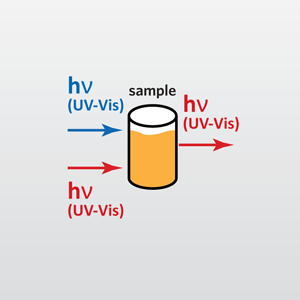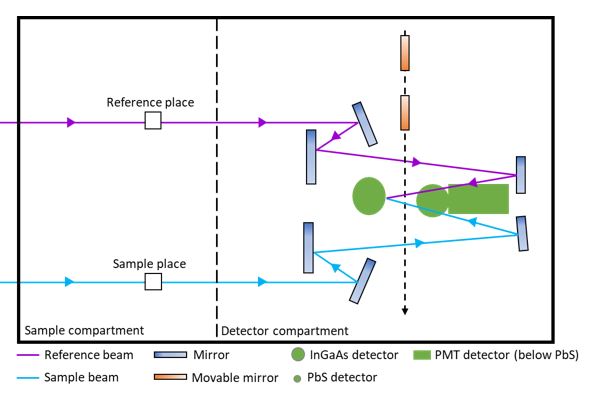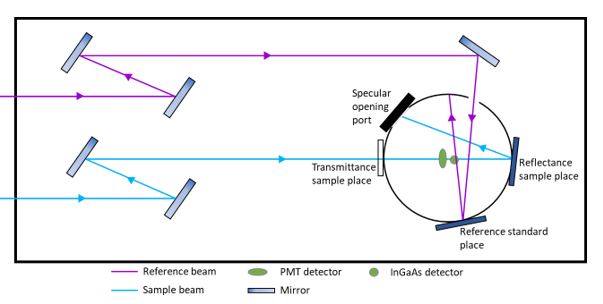Ultraviolet/Visible/Near Infrared Spectroscopy (UV/VIS/NIR)
Home » Our Techniques » Spectroscopy » UV/VIS/NIR
UV/VIS/NIR spectroscopy is a powerful analytical technique to determine the optical properties (transmittance, reflectance and absorbance) of liquids and solids. It can be applied to characterize semiconductor materials, coatings, glass and many other research and manufacturing materials. UV/VIS/NIR operates in the optical range between 175 nm to 3300 nm.
UV/VIS/NIR Analysis of Liquid Samples
UV/VIS/NIR spectroscopy is generally used to determine analyte concentrations or the chemical conversion of a component in solution. The technique measures the absorption of light across the desired optical range. A sample is dispensed into a cuvette and placed in the path between the optical light source and a detector. According to the Beer-Lambert law, with a constant light path length and known absorption coefficient (dependent upon wavelength), the concentration of a compound in question can be determined from the light absorbed at that wavelength.

UV/VIS/NIR Analysis of Solid Samples
A sample is placed in front of the integrating sphere. Light from an optical light source is transmitted through the sample and enters the integrating sphere. The light is then reflected by the internal surface of the sphere and reaches the detector. Both the overall transmittance and the direct transmittance can be measured. From these two parameters, the diffuse transmittance can be derived according to:
Tdiff = Toverall – Tdirect
Measuring the reflectance of a solid sample:
As with transmittance, an integrating sphere is needed to measure the overall reflectance of solid materials. A sample is placed behind the integrating sphere. Light from the optical light source is reflected by the sample and subsequently by the internal surface of integrating sphere, after which it reaches the detector. In addition to overall reflectance, diffuse reflectance can also be measured. Specular reflectance data can be calculated from the overall and diffuse reflectance data:
Rspec = Roverall – Rdiff
Calculating the absorbance of a solid sample: The absorbance percentage is defined as the percentage of the incident beam absorbed by the sample, i.e. that part of the beam which is neither reflected nor transmitted. Absorbance can be calculated from the reflectance and transmittance:
%A = 100% – %Roverall – %Toverall


Ideal Uses of UV/VIS/NIR
- Determination of the optical properties of liquids and solids between 175 nm and 3300 nm
- Quantification of analytes in solutions
- Iron content and valency (Fe2+/Fe3+) determination in glass
- Quality assurance and quality control
- Medical device chemical characterization via ISO 10993:18
Strengths
- Suitable for the determination of the concentrations of a wide variety of analytes in solution
- Quantification of analytes in solutions using UV/VIS/NIR is simpler and less time-consuming than chromatographic analysis
Limitations
- Other components in solution may cause interferences
- Chromatographic analysis methods are more accurate and precise than UV/VIS/NIR methods
- Sample size/sample volume have specific requirements (see technical specifications)
UV/VIS/NIR Technical Specifications
- Wavelength Range: 175-3300 nm (175-2500 nm when using the integrating sphere)
- Beam Size: between 2 mm diameter and 12×8 mm
- Sample Size: between 0.5×0.5 cm and 10×10 cm for solid samples
- Sample Volume: >0.2 mL for liquid samples
Would you like to learn more about using UV/VIS/NIR?
Contact us today for your Ultraviolet/Visible/Near Infrared Spectroscopy needs. Please complete the form below to have an EAG expert contact you.